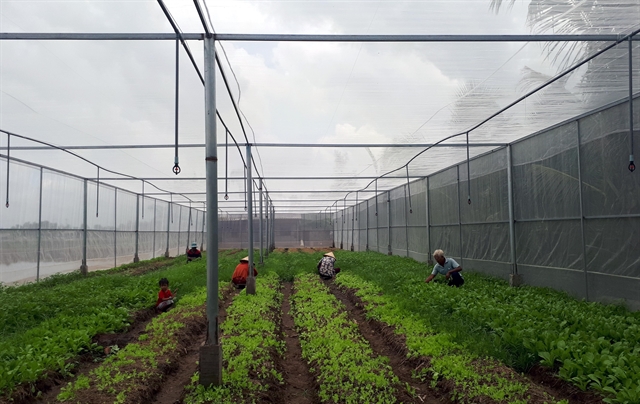
SÓC TRĂNG — The Cửu Long (Mekong) Delta province of Sóc Trăng has expanded organic farming as it helps reduce production costs and is sustainable, and produce grown using the method has steady demand.
The province has 15,400ha of crops grown to organic standards, including 5,000ha of rice, 2,500ha of vegetables and 7,900ha of fruits.
With a coastline of 72km and farming areas accounting for 84.7 per cent of the land surface, the province enjoys advantages in developing agriculture.
Under a restructure plan, it suitably arranged crop cultivation and switched to advanced techniques to increase value.
Huỳnh Ngọc Nhã, director of its Department of Agriculture and Rural Development, said the plan helped increase annual production to VNĐ207 million (US$11,600) per hectare last year, VNĐ130 million ($5,600) higher than 10 years ago.
The cultivation of high-quality and speciality rice varieties has increased to 240,100ha now, up from 5,000ha in 2000 and accounting for 73.2 per cent of the total.
The province is increasing the cultivation of these rice varieties, especially ST 24 and ST 25 that were created by local scientists and are among the world’s best.
It has increasingly mechanised farming, and now 98 per cent of rice is harvested by machines.
It has helped co-operatives develop 17 fruit-growing models that have received production codes for export.
Its Plant Protection Sub-department has granted these codes to 75 areas which grew milk apple, grapefruit, mango, and longan on a total of 497ha as of last year.
The province exports these four fruits to the US, EU and other markets.
Trần Văn Lâu, chairman of the province People’s Committee, said green agriculture with organic, circular and digital farming measures would be prioritised.
But development of green agriculture needs co-operation between farmers, co-operatives, companies, and local authorities, he said.
Relevant authorities should strengthen advocacy to increase public awareness of organic produce, he said.
The province plans to spend more than VNĐ67.6 billion ($2.9 million) by 2030 on its organic agricultural plan.
“The plan aims to link four stakeholders [farmers, scientists, companies, and local authorities] to develop organic farming of some agricultural products,” Nhã said.
The plan will focus on rice, speciality fruits, vegetables, cows, goats, shrimp, and fish and seek to develop linkages between stakeholders for producing and consuming the products.
The province’s animal husbandry has gradually shifted from small-scale to large farms that breed mostly pigs, cows and poultry.
There are also plans to develop large-scale rice fields and brackish water shrimp cultivation.
The province will develop 32 organic farming models that meet international standards on a total area of 210ha by 2030, according to the department.
It also wants to make the value of organic farming 1.2 – 1.4 times that of normal farming and all organic agricultural products to have guarantee outlets by that year.
The province has in recent years built new roads and upgraded existing ones, especially in rural areas, to facilitate the transport and consumption of agricultural products.
It exported seafood worth $1.03 billion and rice worth $213 million last year. — VNS
- Reduce Hair Loss with PURA D’OR Gold Label Shampoo
- Castor Oil Has Made a “Huge” Difference With Hair and Brow Growth
- Excessive hair loss in men: Signs of illness that cannot be subjective
- Dịch Vụ SEO Website ở Los Angeles, CA: đưa trang web doanh nghiệp bạn lên top Google
- Nails Salon Sierra Madre
 VnExpress News The News Gateway of Vietnam
VnExpress News The News Gateway of Vietnam





